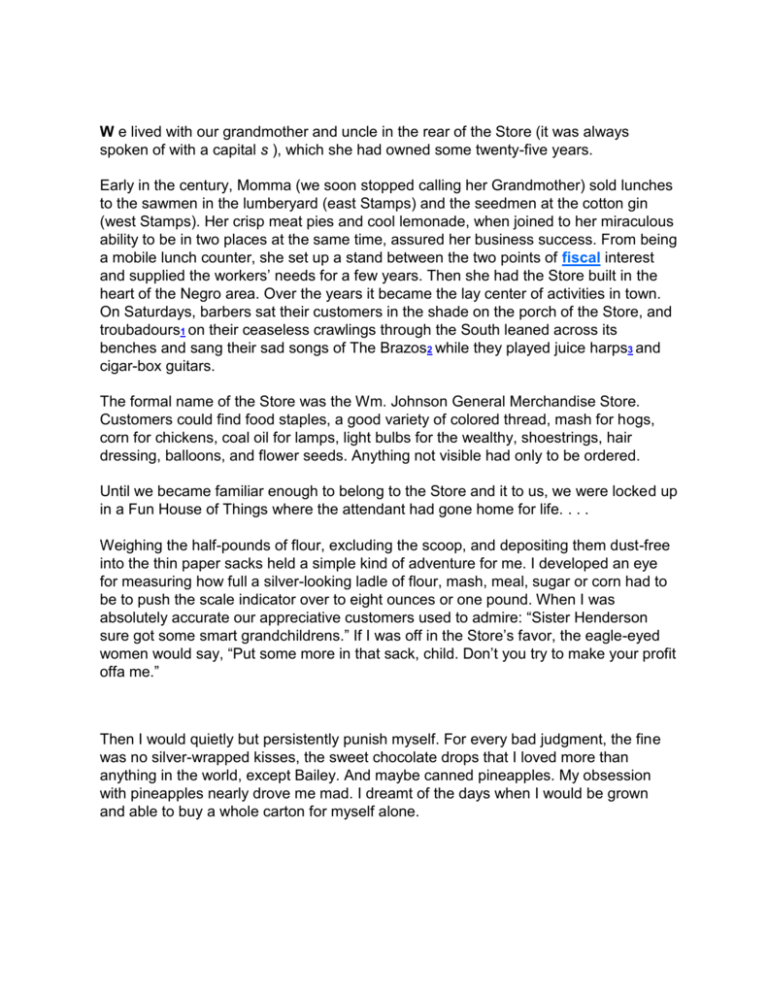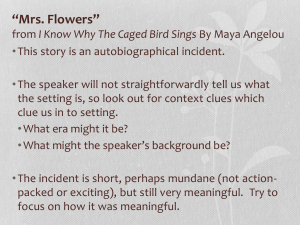I know why the caged bird sings
advertisement

W e lived with our grandmother and uncle in the rear of the Store (it was always spoken of with a capital s ), which she had owned some twenty-five years. Early in the century, Momma (we soon stopped calling her Grandmother) sold lunches to the sawmen in the lumberyard (east Stamps) and the seedmen at the cotton gin (west Stamps). Her crisp meat pies and cool lemonade, when joined to her miraculous ability to be in two places at the same time, assured her business success. From being a mobile lunch counter, she set up a stand between the two points of fiscal interest and supplied the workers’ needs for a few years. Then she had the Store built in the heart of the Negro area. Over the years it became the lay center of activities in town. On Saturdays, barbers sat their customers in the shade on the porch of the Store, and troubadours1 on their ceaseless crawlings through the South leaned across its benches and sang their sad songs of The Brazos2 while they played juice harps3 and cigar-box guitars. The formal name of the Store was the Wm. Johnson General Merchandise Store. Customers could find food staples, a good variety of colored thread, mash for hogs, corn for chickens, coal oil for lamps, light bulbs for the wealthy, shoestrings, hair dressing, balloons, and flower seeds. Anything not visible had only to be ordered. Until we became familiar enough to belong to the Store and it to us, we were locked up in a Fun House of Things where the attendant had gone home for life. . . . Weighing the half-pounds of flour, excluding the scoop, and depositing them dust-free into the thin paper sacks held a simple kind of adventure for me. I developed an eye for measuring how full a silver-looking ladle of flour, mash, meal, sugar or corn had to be to push the scale indicator over to eight ounces or one pound. When I was absolutely accurate our appreciative customers used to admire: “Sister Henderson sure got some smart grandchildrens.” If I was off in the Store’s favor, the eagle-eyed women would say, “Put some more in that sack, child. Don’t you try to make your profit offa me.” Then I would quietly but persistently punish myself. For every bad judgment, the fine was no silver-wrapped kisses, the sweet chocolate drops that I loved more than anything in the world, except Bailey. And maybe canned pineapples. My obsession with pineapples nearly drove me mad. I dreamt of the days when I would be grown and able to buy a whole carton for myself alone. Although the syrupy golden rings sat in their exotic cans on our shelves year round, we only tasted them during Christmas. Momma used the juice to make almost-black fruit cakes. Then she lined heavy soot-encrusted iron skillets with the pineapple rings for rich upside-down cakes. Bailey and I received one slice each, and I carried mine around for hours, shredding off the fruit until nothing was left except the perfume on my fingers. I’d like to think that my desire for pineapples was so sacred that I wouldn’t allow myself to steal a can (which was possible) and eat it alone out in the garden, but I’m certain that I must have weighed the possibility of the scent exposing me and didn’t have the nerve to attempt it. Until I was thirteen and left Arkansas for good, the Store was my favorite place to be. Alone and empty in the mornings, it looked like an unopened present from a stranger. Opening the front doors was pulling the ribbon off the unexpected gift. The light would come in softly (we faced north), easing itself over the shelves of mackerel, salmon, tobacco, thread. It fell flat on the big vat of lard and by noontime during the summer the grease had softened to a thick soup. Whenever I walked into the Store in the afternoon, I sensed that it was tired. I alone could hear the slow pulse of its job half done. But just before bedtime, after numerous people had walked in and out, had argued over their bills, or joked about their neighbors, or just dropped in “to give Sister Henderson a ‘Hi y’all,’” the promise of magic mornings returned to the Store and spread itself over the family in washed life waves. . . . When Maya was about ten years old, she returned to Stamps from a visit to St. Louis with her mother. She had become depressed and withdrawn. For nearly a year, I sopped around the house, the Store, the school and the church, like an old biscuit, dirty and inedible. Then I met, or rather got to know, the lady who threw me my first lifeline. Mrs. Bertha Flowers was the aristocrat4 of Black Stamps. She had the grace of control to appear warm in the coldest weather, and on the Arkansas summer days it seemed she had a private breeze which swirled around, cooling her. She was thin without the taut look of wiry people, and her printed voile5 dresses and flowered hats were as right for her as denim overalls for a farmer. She was our side’s answer to the richest white woman in town. Her skin was a rich black that would have peeled like a plum if snagged, but then no one would have thought of getting close enough to Mrs. Flowers to ruffle her dress, let alone snag her skin. She didn’t encourage familiarity. She wore gloves too. I don’t think I ever saw Mrs. Flowers laugh, but she smiled often. A slow widening of her thin black lips to show even, small white teeth, then the slow effortless closing. When she chose to smile on me, I always wanted to thank her. The action was so graceful and inclusively benign . She was one of the few gentlewomen I have ever known, and has remained throughout my life the measure of what a human being can be. . . . One summer afternoon, sweet-milk fresh in my memory, she stopped at the Store to buy provisions. Another Negro woman of her health and age would have been expected to carry the paper sacks home in one hand, but Momma said, “Sister Flowers, I’ll send Bailey up to your house with these things.” She smiled that slow dragging smile, “Thank you, Mrs. Henderson. I’d prefer Marguerite, though.” My name was beautiful when she said it. “I’ve been meaning to talk to her, anyway.” They gave each other age-group looks. Momma said, “Well, that’s all right then. Sister, go and change your dress. You going to Sister Flowers’s. . . .” There was a little path beside the rocky road, and Mrs. Flowers walked in front swinging her arms and picking her way over the stones. She said, without turning her head, to me, “I hear you’re doing very good school work, Marguerite, but that it’s all written. The teachers report that they have trouble getting you to talk in class.” We passed the triangular farm on our left and the path widened to allow us to walk together. I hung back in the separate unasked and unanswerable questions. “Come and walk along with me, Marguerite.” I couldn’t have refused even if I wanted to. She pronounced my name so nicely. Or more correctly, she spoke each word with such clarity that I was certain a foreigner who didn’t understand English could have understood her. “Now no one is going to make you talk—possibly no one can. But bear in mind, language is man’s way of communicating with his fellow man and it is language alone which separates him from the lower animals.” That was a totally new idea to me, and I would need time to think about it. “Your grandmother says you read a lot. Every chance you get. That’s good, but not good enough. Words mean more than what is set down on paper. It takes the human voice to infuse them with the shades of deeper meaning.” I memorized the part about the human voice infusing words. It seemed so valid and poetic. She said she was going to give me some books and that I not only must read them, I must read them aloud. She suggested that I try to make a sentence sound in as many different ways as possible. “I’ll accept no excuse if you return a book to me that has been badly handled.” My imagination boggled at the punishment I would deserve if in fact I did abuse a book of Mrs. Flowers’. Death would be too kind and brief. The odors in the house surprised me. Somehow I had never connected Mrs. Flowers with food or eating or any other common experience of common people. There must have been an outhouse, too, but my mind never recorded it. The sweet scent of vanilla had met us as she opened the door. “I made tea cookies this morning. You see, I had planned to invite you for cookies and lemonade so we could have this little chat. The lemonade is in the icebox.” It followed that Mrs. Flowers would have ice on an ordinary day, when most families in our town bought ice late on Saturdays only a few times during the summer to be used in the wooden ice cream freezers. She took the bags from me and disappeared through the kitchen door. I looked around the room that I had never in my wildest fantasies imagined I would see. Browned photographs leered or threatened from the walls and the white, freshly done curtains pushed against themselves and against the wind. I wanted to gobble up the room entire and take it to Bailey, who would help me analyze and enjoy it. “Have a seat, Marguerite. Over there by the table.” She carried a platter covered with a tea towel. Although she warned that she hadn’t tried her hand at baking sweets for some time, I was certain that like everything else about her the cookies would be perfect. They were flat round wafers, slightly browned on the edges and butter-yellow in the center. With the cold lemonade they were sufficient for childhood’s lifelong diet. Remembering my manners, I took nice little ladylike bites off the edges. She said she had made them expressly for me and that she had a few in the kitchen that I could take home to my brother. So I jammed one whole cake in my mouth and the rough crumbs scratched the insides of my jaws, and if I hadn’t had to swallow, it would have been a dream come true. As I ate she began the first of what we later called “my lessons in living.” She said that I must always be intolerant of ignorance but understanding of illiteracy. That some people, unable to go to school, were more educated and even more intelligent than college professors. She encouraged me to listen carefully to what country people called mother wit. That in those homely sayings was couched the collective wisdom of generations. When I finished the cookies she brushed off the table and brought a thick, small book from the bookcase. I had read A Tale of Two Cities and found it up to my standards as a romantic novel. She opened the first page and I heard poetry for the first time in my life. “It was the best of times and the worst of times . . .” Her voice slid in and curved down through and over the words. She was nearly singing. I wanted to look at the pages. Were they the same that I had read? Or were there notes, music, lined on the pages, as in a hymn book? Her sounds began cascading gently. I knew from listening to a thousand preachers that she was nearing the end of her reading, and I hadn’t really heard, heard to understand, a single word. “How do you like that?” It occurred to me that she expected a response. The sweet vanilla flavor was still on my tongue and her reading was a wonder in my ears. I had to speak. I said, “Yes, ma’am.” It was the least I could do, but it was the most also. “There’s one more thing. Take this book of poems and memorize one for me. Next time you pay me a visit, I want you to recite.” I have tried often to search behind the sophistication of years for the enchantment I so easily found in those gifts. The essence escapes but its aura6 remains. To be allowed, no, invited, into the private lives of strangers, and to share their joys and fears, was a chance to exchange the Southern bitter wormwood7 for a cup of mead with Beowulf8 or a hot cup of tea and milk with Oliver Twist. When I said aloud, “It is a far far better thing that I do, than I have ever done . . .”9 tears of love filled my eyes at my selflessness. On that first day, I ran down the hill and into the road (few cars ever came along it) and had the good sense to stop running before I reached the Store. I was liked, and what a difference it made. I was respected not as Mrs. Henderson’s grandchild or Bailey’s sister but for just being Marguerite Johnson. Childhood’s logic never asks to be proved (all conclusions are absolute). I didn’t question why Mrs. Flowers had singled me out for attention, nor did it occur to me that Momma might have asked her to give me a little talking to. All I cared about was that she had made tea cookies for me and read to me from her favorite book. It was enough to prove that she liked me. Thinking About the Selection 1. Respond: Did you find Mrs. Flowers’s words and actions inspiring? Explain. 2. (a) Recall: What are two customer reactions when Marguerite weighs their goods on the scale? (b) Infer: How does she feel when a customer criticizes her? (c) Draw Conclusions: What does Marguerite’s reaction show about her personality? 3. (a) Recall: What does Mrs. Flowers do when Marguerite visits? (b) Infer:What do the actions of Mrs. Flowers prove to Marguerite? (c) Interpret: Why has Mrs. Flowers remained for Angelou “The measure of what a human being can be”?





